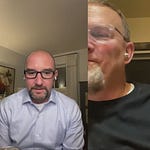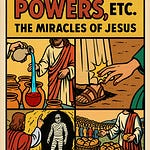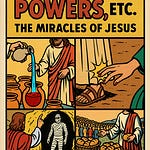Psalm 23
Gerhard Von Rad was a Lutheran curate and a member of the dissident Confessing Church in Nazi Germany. Von Rad was also a biblical scholar who felt called by the LORD to teach the Old Testament, a specialty which put him at odds with the antisemitic ethos that had captured the German academy. One of his many books is a collection of sermons, the introduction of which is an address to seminary students entitled, “About Exegesis and Preaching.”
To future proclaimers at Princeton Theological Seminary, Von Rad posited the following:
“The great discovery which all of you must make in preaching is that the texts themselves actually speak. The prophet Isaiah must have experienced something like a panting and groaning on God’s part when he was silent for a while! The best sermons are those in which one notes the preacher’s own surprise that— and how— the text suddenly began to speak. . . . I give you beginners about ten to twenty sermons during which you will repeat all of what you have learned. Then you will have preached yourselves out. You will have nothing left to preach worth any hearer’s time and attention. Then if you do not make the discovery that every text wants to speak for itself, you are lost. We are dealing with that word that is sharper than a two-edged sword.”
The scriptures wants to speak for themselves.
The Word wants to word you.
If the twenty-third psalm wants to have a word of its own, then what does it wish to say? Of all its images, claims, and promises what is the one word it wants to speak? It’s hiding in plain sight at the center. The Lord Jesus hides his promise smack dab in the middle of David’s prayer. There are precisely twenty-six Hebrew words before it and twenty-six Hebrew words after it. It is the numerical heart of the psalm. And it is point at which third person profession gives way to second person address; it is the place where speaking of God turns to speaking to God.
What the Word wants to speak for itself are four little words.
“You are with me.”
You cannot see this in English, but in Hebrew the message is clear. Whether we are in the valley of the shadow of death or surrounded by enemies, the abiding presence of the LORD with you is the beating heart of the poem. Left to talk by itself, this is what this scripture wants to say, “You are with me.”
But how?
In what way is the LORD always nevertheless with us? Herein lies the difficulty in the professor’s prescription to preachers. When we leave the scriptures to speak for themselves, it is not always clear what they mean by what they say. These four little words at the numerical heart of the psalm sound like a basic statement of faith, yet they recur nowhere else in the Bible’s prayerbook.
You are with me.
kî-ʾattâ ʿimmādî
But how?
How is he with you?
The Targum, the Aramaic translation of the Hebrew Scriptures, attempts to elide the confusion by rendering verse four, “Your word is my help.” Saint Augustine tried to resolve the question latent in the claim by paraphrasing the verse, “You live in my heart through faith.” But if the LORD is present to me merely inside of me, then it is not clear how he is able to correct my errant ways with his staff or with his rod scare off those who would do me harm. The Shepherd’s crook and stick are comforting precisely because they are physical not spiritual.
The LORD who is with me is with me.
Not in me.
Whyever would you want a god whose presence to you is only spiritual?
A spiritual relationship with God could never be an authentic relationship.
The LORD who is with me is with me.
But how?
“God is with us,” we say.
“The LORD be with you,” I call.
“And also with you,” you respond.
Where?
How?
We employ this language all the time without stopping to ask what it means. If “you are with me” is what this scripture wants us to hear, what does it mean by what it says?
There is a woman who worships with us online. Susan lives in Colorado. She is a retired seminary professor and pastoral counselor. Often on Sundays or Mondays she will send me a note. Her brave candor and deep faith astonish me.
Earlier this week, Susan responded to the sermon thusly:
“Dear Jason,
First, I want you to know I pray for you. I prayed for you this morning. It is clear to me you are in a dance nobody wants to get asked to dance.
I have written you before about my adult children— suffering with addiction and mental illness. Just when I thought I was catching my breath, last week my mother was diagnosed with Alzheimer’s. I have wondered why so much of the suffering I am in the midst of has to do with broken brains— altered thinking, anxious thinking, and now Alzheimer's thinking.
We have this saying in my Twelve Step meeting (we have a lot of sayings): "Our best thinking got us here." Ha! I have always thought I was pretty smart. Straight A's in school. Graduated magna cum laude. I'm an 8 on the Enneagram (I have wondered if you might be also)— The Challenger.
Well, God has bested me with challenges that I can't challenge. He has actually whispered to me, "Will you stop trying to figure things out? I just want you to dance with me." I grew up Baptist. I'd rather debate than dance any day.
But I can't debate anymore. I am pressed right up against the barbed wire and God is asking me to dance. And it is not pretty. I truly no longer know what to do, and that is when (of all times!) I hear Him say, "There she is - she doesn't know what step to take next. This is what I am learning: the only way to face cancer, addiction, mental breakdowns, Alzheimers is to get into Jesus.
— Susan”
Pay attention to her choice of prepositions, “The only way to face cancer, addiction, mental breakdowns, Alzheimers is to get into Jesus.”
After King David defeats the Philistines, he and his army of thirty thousand aim to escort the ark of God to Jerusalem. But for reasons not germane to today David decides otherwise. “David was not willing,” notice the language, “to take the LORD in to the city of David.” David leaves the ark with Obed-edom the Gittite. And for three months— again, notice the language— “The ark of the LORD remained in the house of Obed-edom and the LORD blessed Obed-edom and all his household.”
You are with me.
The LORD blessed Obed-edom because the LORD was living there!
When David hears the news of Obed-edom’s blessings, he returns to fetch the ark; whereupon, the word of the LORD pledges a covenant with David:
“Would you build me a house to live in? I have not lived in a house since the day I brought up the people of Israel from Egypt to this day, but I have been moving about in a tent for my dwelling…Now, therefore…’Thus says the Lord of hosts, I took you from the pasture, from following the sheep, that you should be prince over my people Israel. And wherever you went, I have been with you…”
Literally, the LORD was with David.
With him not in him.
With him.
Not in some vague, numinous, spiritual way.
But physically, tangibly.
Whether in the in the valley of the shadow of death or surrounded by enemies or content along the quiet waters, David could know the LORD was with him because God had an address.
As the Jewish theologian Michael Wyschogrod
“Now of course God’s dwelling in the temple does not exclude the truth that he also dwells everywhere else. He also dwells in any part of the universe. There is no place in which God is not present. But this truth must be combined with the insistence that there is a place where God dwells embodied and that place is Jerusalem. He dwells in Number One Har Habayit Street— Number One Temple Mount Street. It is a real dwelling and for every Jew, the sanctity of the land of Israel derives from the sanctity of Jerusalem, and the sanctity of Jerusalem derives from the sanctity of the temple, and the sanctity of the temple derives from the sanctity of the holy of holies where [still] God dwells.”
2 Samuel 6-7 wants to speak for itself, and what it says is that David could know the LORD was with him because God had an address.
God was locatable.
He is ever thus.
My friend Adam teaches theology at the University of Nottingham in England. His move overseas has meant a transfer from the Lutheran Church to the Church of England.
Last Sunday he wrote that he had witnessed a miracle at his new church:
“Last night I witnessed a miracle, though nothing that might seem too out of the ordinary from a merely human perspective. Thirty people, all but a few of them adults, were confirmed in the Church of England at a combined service for Nottingham city churches. Twenty-two of the thirty new Christians were Iranians from non-Christian backgrounds. Mohammed (all sorts of spellings) may be the most popular male baby name in the UK, but it was also the most popular name for Anglican confirmands yesterday.
There were three of them.
As part of the rite, I heard a testimony from an Iranian woman who had been married off below even the legal age for marriage in Iran— she was a true child bride— got pregnant extremely young, wasn't cared for by family, and lost the child and her own fertility in an accident on account of that lack of care. Then her husband divorced her, so she was truly alone.
She fled Iran, and she began to encounter Christians. The miracle in her life— it was the joy of Christians, their care and compassion for her, the way men and women could speak honestly to one another about their fears and their sins, their willingness to pray with one another for one another, their ability to listen to each other's voices, and share Jesus.
About Jesus, she testified: ”He set me free."
That's who he really is— or where he is, apparently even in the strange, deeply flawed world of the Church of England.”
Once again—
Take note of Adam’s choice of adverb, “That's where he is.”
And pay attention to how he described the miracle that happened in her life, “Their ability to share Jesus.”
Not share about Jesus.
Share Jesus.
As though Jesus lived there and made himself available to them all.
“The only way to face cancer, addiction, mental breakdowns, Alzheimers, hell is to get into Jesus.”
The miracle Adam witnessed is not simply that a community of Christians shepherded a hell-singed woman to faith in Christ.
The miracle Adam witnessed is the mystery that somehow that community of Christians is the body of the Risen and Crucified Christ.
We commit an odd act every Sunday.
In the rule of faith, as one item of our belief— without which one is not a Christian— we confess our faith in the church. Though the creed directs us to profess our belief in God the Creator, the creed does not posit that we should place our faith in the world. But we do place our faith in the church. The church is not a normal community of this world but is herself the content of our belief.
Oddly, we confess our faith in the church.
The point is theologically elementary and basic to the New Testament. Christ is the LORD’s located presence in the world. To be located in the world, Jesus must have a body. The church, the scriptures reveal, is that body of Christ: “The Father of glory put all things under Christ’s feet and gave him as head over all things to the church, which is his body, the fullness of him who fills all in all.”
To turn that announcement into a metaphor is to make an interpretative move not warranted by the text— you have to let the text speak for itself!
That the church just is the body Mary’s boy takes after Easter is how Paul— who was not present on Good Friday— can declare to the churches in Galatia, “I have been crucified with Christ.”
That the church is the body of the Risen Jesus is the cornerstone of Paul’s theology of baptism, “Do you not know that all of us who have been baptized into Christ Jesus were baptized into his death?” “You have died,” Paul proclaims to the Colossians, "and your life is hidden with Christ.”
Again, let the word speak what it wants to say!
These are not mere metaphors.
God is not nowhere in the world.
When I say “The Lord be with you” and you respond “And also with you,” we are not casting a wish. We are naming reality. Truly, we should let the Great Thanksgiving govern all our corporate prayers. For if we are the body of him who is our head, then we should pray with our eyes open.
When we pray, we should look at one another.
We are Jesus.
Again, shirk not from the claims of scripture.
Let the texts speak for themselves!
Which means, if you think sinners like us cannot possibly constitute God’s body, then, quite simply, the god you are worshipping is an idol. And you should repent and turn to the true God.
That we ourselves are how he is with us is at the heart of the central teaching in the Epistle to the Corinthians.
The church father John of Damascus let those passages speak for themselves when he wrote:
“The Eucharist is called “communion” and truly it is. For through it we both commune with Christ and share in his body as well as in his deity, and commune and are united with one another. For as we eat of one loaf we become one body and one blood of Christ and members of one another. Thus we may be called co- embodiments of Christ.”
The church father Irenaeus of Lyons makes the same precise point:
“The God who becomes what we are is the God-man; what he becomes is what we actually are, fallen and passible man, condemned to death; and we become what he is, humans so united with God as to receive and bear God.”
We are not a country club!
We are not the Jesus Memorial Society!
We are not a Christ-flavored political movement!
We are his body!
Incidentally, this is why it is grave mistake to leave the church over political differences or social issues. These are the sinners he’s chosen to constitute his body; therefore, to leave the body is to walk away from Jesus.
To leave the body is to walk away from Jesus.
I understand that sounds offensive.
Just realize, what offends you is the incarnation.
Jesus makes himself available to us in loaf and cup; so that, Jesus can make himself available to the world in this body.
When I pray “For thou art with me,” I should be looking at you.
“There is no other way to know God; there is no other God to know.”
At the end of September, Susan sent me another note after worship.
She wrote:
“Dear Jason,
I'm sorry to hear you're a part of the PTSD club. As a therapist, I can tell you it's no joke. As a mother, I can tell you it's harrowing, unpredictable, and often unearths my mustard seed of faith.
It has been a season of it for me with both of my children— both of them somewhere in the process of addiction and recovery. I've written you before about my beautiful, brilliant son who has been in treatment for alcoholism (more off than on) for the past two and a half years.
And so every time he calls or there's a certain tone in his voice or life throws him a challenge, PTSD whispers: "Be afraid.The other shoe is about to drop. Again."
My son has been sober for the past six weeks. He's gone to church every Sunday. Last week he sent me this quotation from social media: “What made me love Christ wasn't that all of a sudden I started figuring out how to do life. What made me love Christ is that when I was at my worst, when I absolutely could not clean myself up— right at that moment, Christ said, “I'll take that one. That's the one I want.'"
Here I am, Jason, this raggedy mom who so often doesn't know what to say, whose heart is filled with lumpy anxiety, and whose head is filled with enough stories to create PTSD for years. I sorrow with you.
I hope with you. And I pray for you. There have been many dark days this year for me, but God has found ways to make windows. I am praying for windows for you too.
— Susan
These past few months I’ve come to depend on her notes. If you resist imposing your contemporary, pagan prejudices upon the texts, if you let the scriptures speak for themselves, the claim is clear (if incomprehensible). Someone like Susan just is how Jesus has chosen to be Jesus with us.
Jesus doesn’t stop being Immanuel.
He just takes a different body.
As Robert Jenson puts the mystery:
“Where does the risen Christ turn to find himself? To believers gathered around loaf and cup. To the question “Who am I?” Jesus answers, “I am this community’s head. I am the one who died to gather them. I am the subject whose objectivity is this community.”
I am the subject whose objectivity is this community.
Shortly after I made it known that my cancer had come back with a vengeance, a friend— one of you— sent me a sympathy card. On the front of the card, a cancer patient kneels on the floor, gripping the sides of a toilet with both hands. A wheeled IV stands vigil next to her. An ink rendition of Jesus holds back the patient’s thinning hair from catching the sick. On the inside, the card offers a memory verse from the New Testament, “I can do all things through Christ who strengthens me.”
Now—
If Christ is with me merely in a metaphorical, spiritual sense, if Jesus is inside me, if he is in my heart by faith, if he is everywhere (unseeable, unhearable, untouchable), then that verse is a terrifically terrible law.
It is burdensome and accusatory; it is lethal to faith.
Because— trust me— I know what it feels like to think, “I can’t do all this.” And if I so think and Jesus is only inside me, then the problem is me.
But if you let the scripture speak for itself, Paul’s meaning is clear and incontrovertible, “I can do all things through [the body of] Christ who strengthens me.”
I can do it— through you and you and you and you and you. And you can do whatever gives you lumps of anxiety. You can do it through them. And as the communion prayer reminds us, the them that constitutes the church is a whole lot larger than just the living.
This is how Jesus is Jesus with us.
And that is no law.
Quite the opposite, it is a promise not a one of us deserves.
Some come to the table.
And as you come with hands held out, let your eyes follow suit.
Keep them open.
You thought you were coming to church today.
Though nothing might seem too out of the ordinary from a merely human perspective, today you got into Jesus. There is no other way to know God. There is no other God to know.
Just so—
The Lord be with you.
And also with you.













